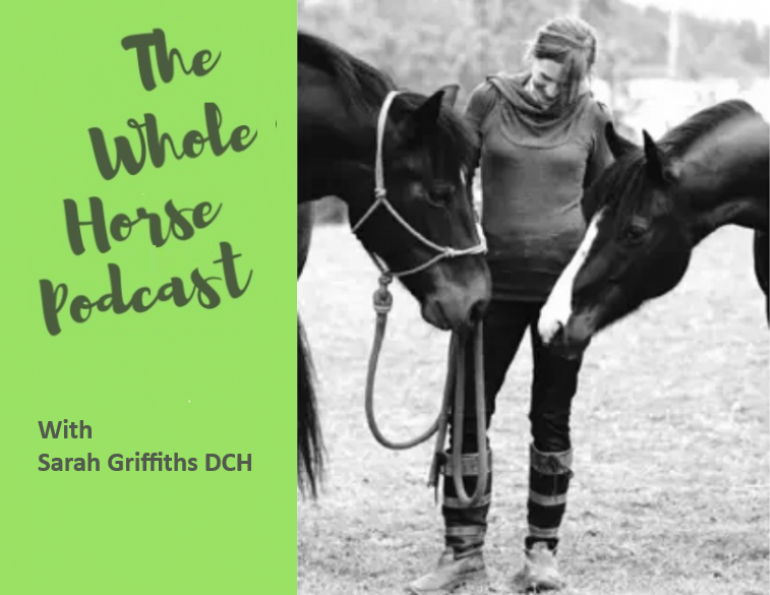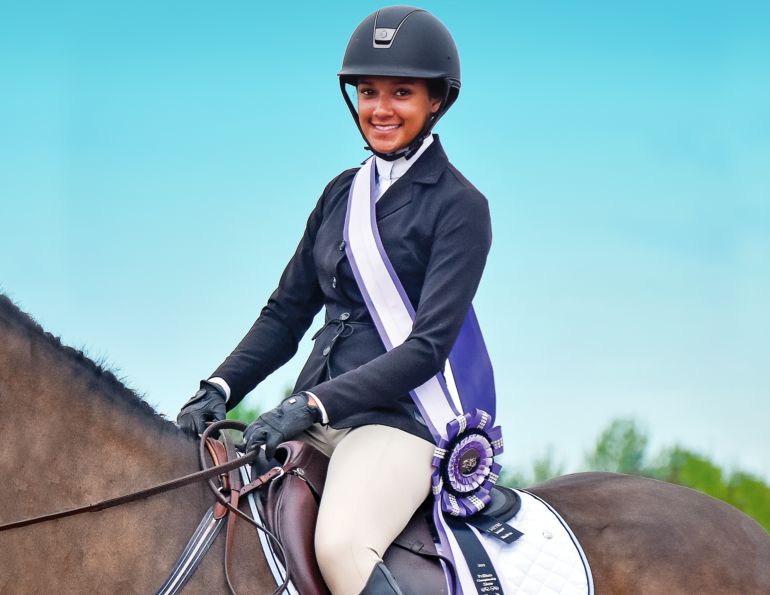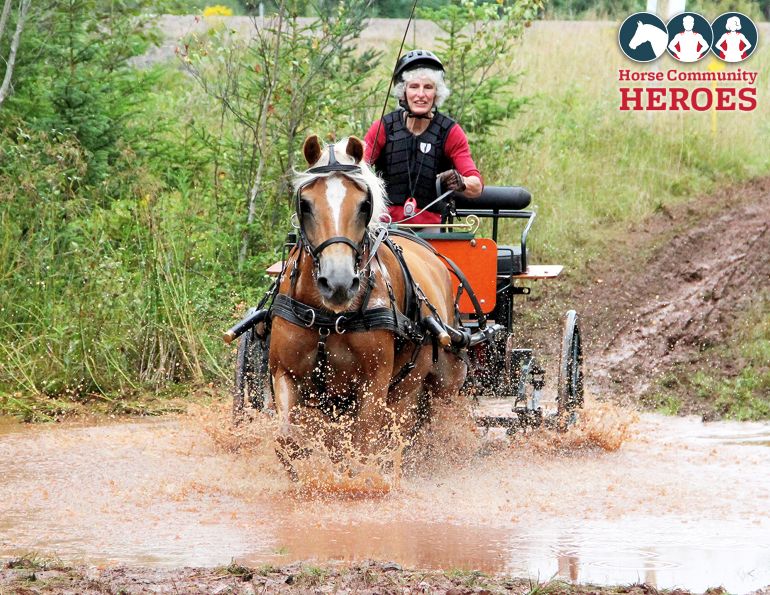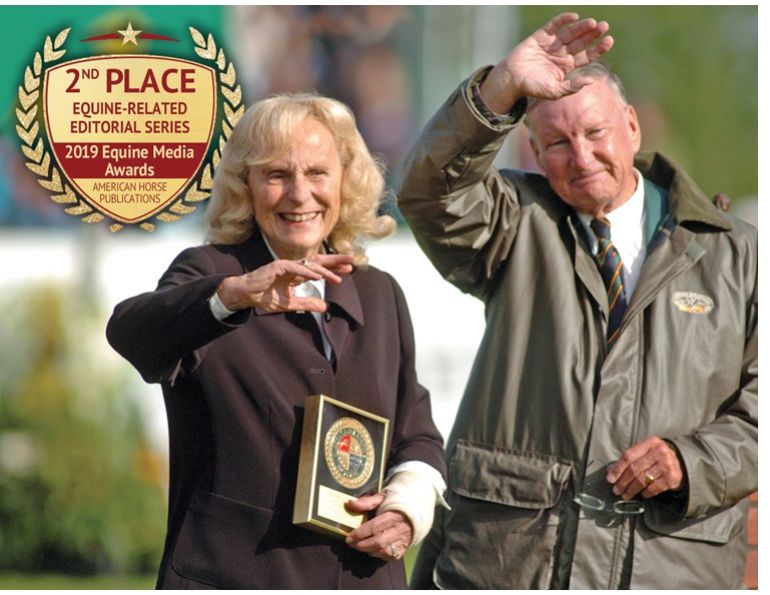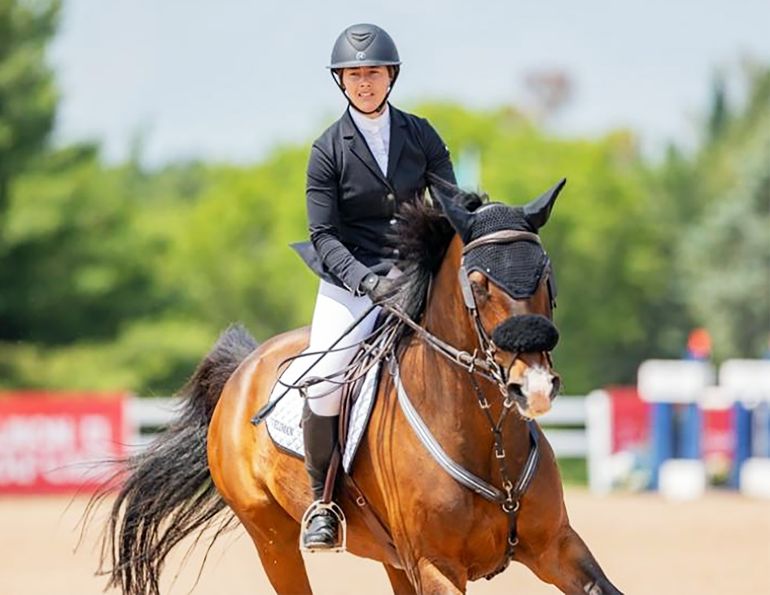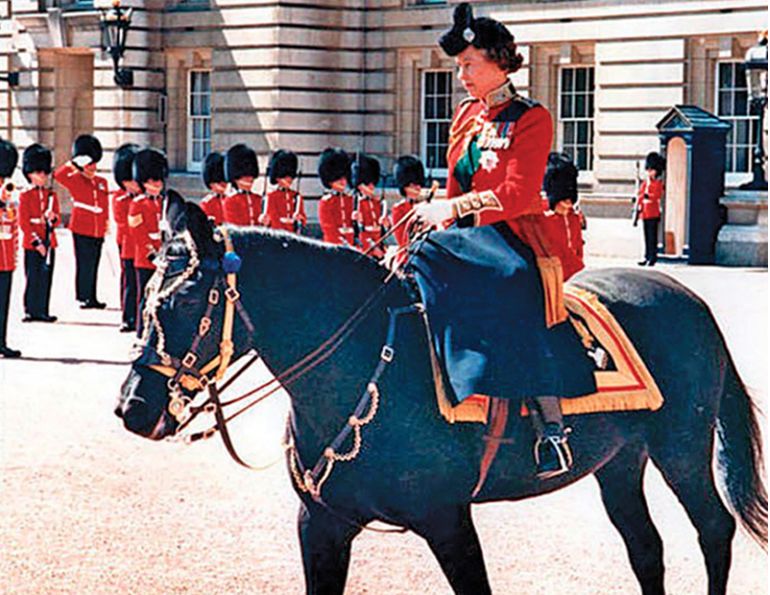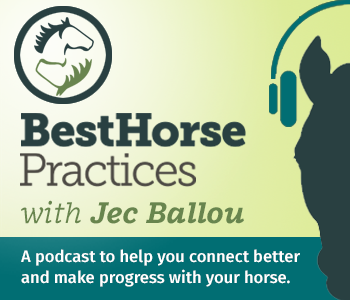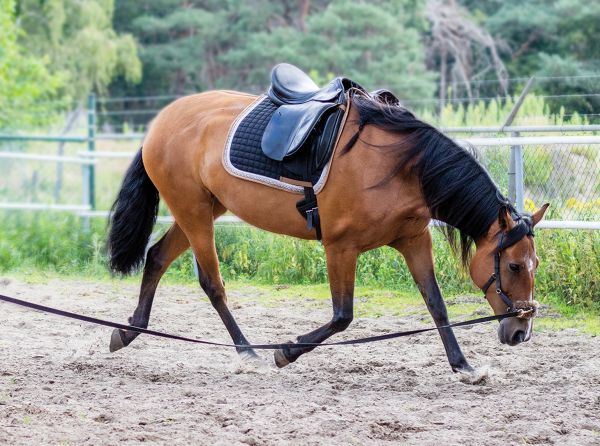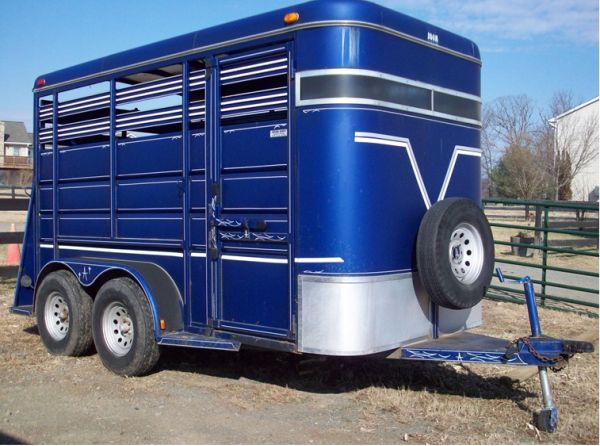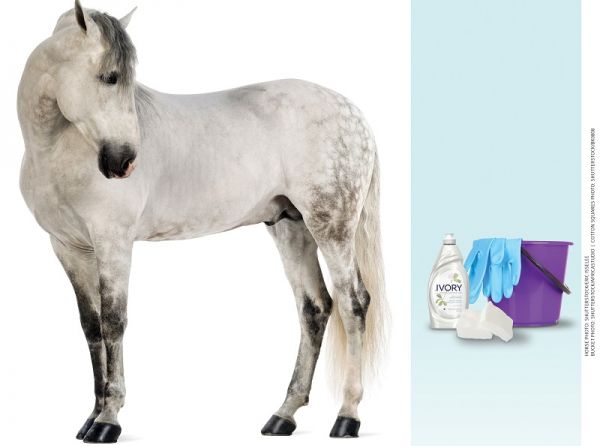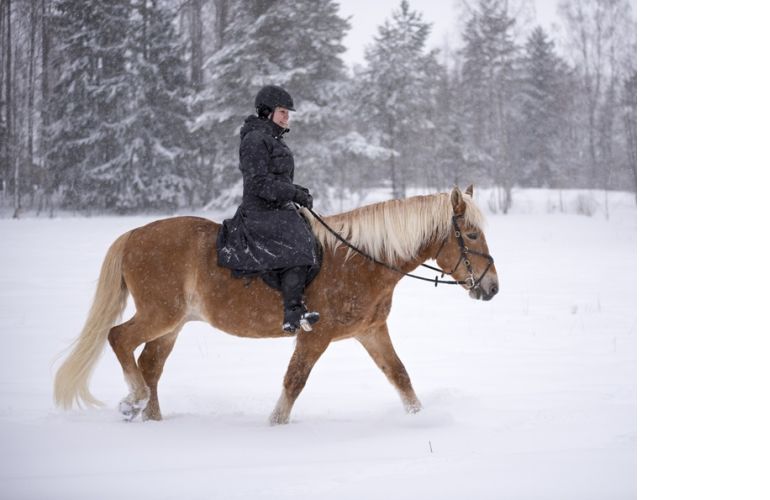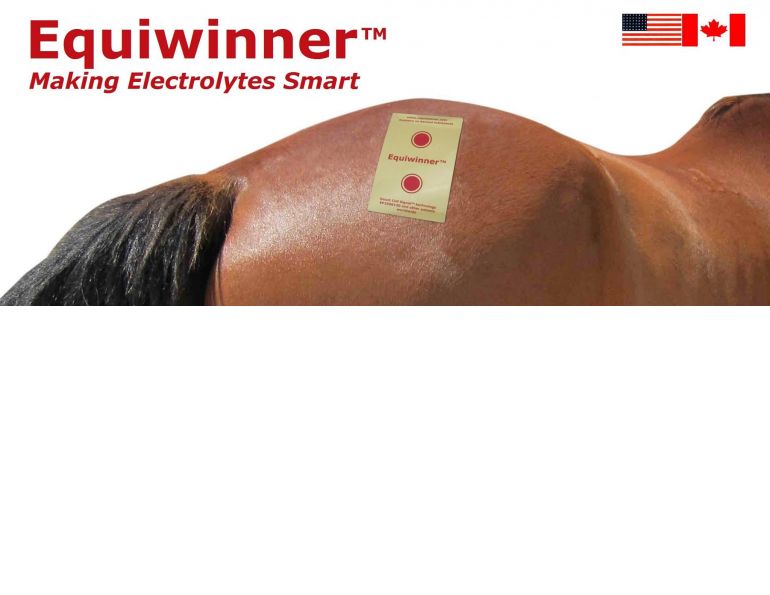5 Inspiring Stories
By Tania Millen, BSc, MJ
Representing Canada at the Olympic Games is the Holy Grail for many riders, but not every rider has the good fortune to get there. Those who represent Canada at the Games all have very different stories about how they qualified, the experiences they had, and the exceptional horses they were fortunate to ride.
Canada’s top-placed three-day event riders from the 1976 through 2008 Olympic Games have had many years to reflect on their Olympic experiences and fortunately, five of those determined men and women were happy to share some of their life lessons, anecdotes, and wisdom with those who want to follow in their hoofprints. These are their stories.
JULIET GRAHAM
Not Just a Family Horse
In 1976, 22-year-old Juliet Graham rode her feisty mare, Sumatra, at the Bromont-based Montreal Olympics, finishing 11th as the top-placed Canadian three-day event rider. Now a part-time riding coach in Virginia, Graham says, “It probably would have meant a little more if I’d been a little older. I remember feeling a bit like a deer in the headlights. It was an unreal experience.”
Graham grew up on Graham Ranch in southern Alberta where Sumatra was born and raised, and says, “The ranch was the eventing mecca and party central for a long time. When I was 12, someone rode a tricycle off the diving board into the pool. That didn’t end well,” she laughs.

Juliet Graham with her talented mare, Sumatra, in 1976. Photo courtesy of Juliet Graham
“Sumatra was a horse that Michael Herbert (Canada’s three-day eventing team coach) told my mother was a nice family horse because the whole family could sit on top of it.” Considering the mare went on to gallop around all the top courses in the world multiple times, Graham says, “We never let him forget that.”
In her late teens, Graham went to England with Sumatra and they completed world-renowned Burghley three times, Badminton twice, plus the 1974 World Championships where she placed eighth.
Related: The Magic of Sport Horse Syndicates
“That’s where I got my mileage,” she says. “I came back and qualified (for the 1976 Olympics) in the United States and Canada.
“It was incredible walking into the stadium being a Canadian at a Canadian Olympic Games. We were the last team to go into the stadium and we had to walk for miles in very, very uncomfortable shoes. I knew a lot of people and it was amazing having all those people together in one place.”
After the 1976 Olympics, Graham rode at two more world championships, winning a team gold medal in 1978. In 2009, Graham and the rest of the 1978 gold medal-winning three-day event World Championship team were inducted into the Canadian Eventing Hall of Fame.

“It was incredible walking into the stadium being a Canadian at a Canadian Olympic Games,” says Juliet Graham of her 1976 Montreal Olympics experience. Photo courtesy of Juliet Graham
Although she continued to ride, eventually there was a period where Graham was too busy with a business and family to compete. She says, “There was a time when I didn’t do an event for 10 years. Then I got back into it and rode to intermediate but… it’s so expensive and life consuming.” She also had a brief but successful career as a steeplechase jockey.
Subsequently, Graham was part of Canada’s high performance and three-day eventing team selection committee for many years, and she’s still riding and teaching today. Looking back on how the Olympics changed her life, she says, “It was a confidence boost. I still teach a lot and a lot of that goes back to being an Olympian.”
Graham admits she has never had another horse like Sumatra, saying, “She was a helluva horse.”
NICK HOLMES-SMITH
Pressure, Determination, and Dreams
Nick Holmes-Smith knows what it takes to get to the Olympics. He rode at three Olympic Games between 1980 and 1992, all on different horses.
“The Olympics is the penultimate competition, so getting there and competing at that level - that’s an achievement in itself,” he says. “But I don’t look back and say it was a fun experience or a blast – for the large part it was I want to get through this and ride well and do my best.”

Nick Holmes-Smith competing with Sir Lancelot at the Barcelona Olympics in 1992. Photo: Clix Photography
In 1980, western countries boycotted the Moscow Olympics so an Alternate Olympics was held in Fontainebleau, France. Holmes-Smith rode at those Games, but was eliminated.
Related: Finding Paths to Success for Equestrian Youth
He subsequently rode at the 1988 Olympics in Seoul, where he was 14th and the top-placed Canadian, riding New Zealand Thoroughbred, Espionage. Holmes-Smith’s second horse, a big bay mare named Maiden Cruise, was flown to Seoul as a reserve and he says, “…she languished while we were competing.” But the Canadian Team was known for its “ride hard, play hard” attitude, and “…after the event, all the riders were partying and a bunch of riders said ‘bring that mare over here and jump her,’ so we did. Those were some of the silly shenanigans…”
Four years later, Holmes-Smith rode New Zealand-bred Sir Lancelot at the Barcelona Olympics in 1992, but had a stop and a fall. He says, “Dealing with the pressure and keeping a good mindset is really important. In 1988, I did a good job of that but in 1992, I didn’t. Determination and perseverance come easily to me. But I think attention to detail and being mentally strong… is the difference between success and failure.”
He continues, “I don’t think coaches or owners or other riders put pressure on riders. The pressure is from ourselves. I was not nearly as relaxed as I could have been, so I beat myself up when I didn’t do well.” He explains, “I think some people are really good competitors. People who really love competing are the ones who do well.”
After the 1992 Olympics, Holmes-Smith wanted a change. Passionate about skiing, he settled down in his home province of British Columbia, built Chase Creek event course, and started a family and his Mustang Powder cat-skiing business. His wife and three daughters all ride, but he says, “The family relationship complicates things for teaching the kids, but I still teach them a little bit.” He laughs, saying, “I’m a useful Dad. After school when the kids want to do some jumping they need someone to set the jumps for them, right?”

Holmes-Smith with Maiden Cruise at the World Equestrian Games in 1990. “I don’t think coaches or owners or other riders put pressure on riders. The pressure is from ourselves.” Photo: Clix Photography
But he also says, “…as time goes by, the Olympics are not so much part of your identity anymore. Most people I run into don’t know I rode at the Olympics.”
Although Holmes-Smith’s Olympic experiences don’t affect his day-to-day life much anymore, subconsciously they’ve made a big impression. He shares, “I have a dream that keeps coming back. It’s always a bit different but basically the Olympics are just a few days away and I’ve been distracted and haven’t been riding and practicing. Or sometimes it’s just a few minutes before my Olympic dressage test and I haven’t learned the test yet. So here we are 30 years later and I’m still having dreams about being totally unprepared for the Olympics!”
ROB STEVENSON
Blind Faith and Staying the Course
For Rob Stevenson – Canada’s top-placed three-day event rider at the 1992 Barcelona Olympics – a barn fire and the cross-country ride that qualified him for the Olympics changed his life.
In 1988, with his family’s support, Stevenson committed to spending four years with four horses trying to make Canada’s Three-Day Eventing Team before going to medical school. But after losing two intermediate level horses in a barn fire in July 1991, Stevenson only had one upper level horse left. He says, “It was a pretty devastating time. It was certainly a turning point for me. We gathered together as a family to decide: Are we going to keep going or am I just going to go back to school and throw in the towel? That was a tough time. It was really hard to know what to do.”

Rob Stevenson, shown competing at Rolex Kentucky Three-Day Event, was inducted into New Brunswick’s Sports Hall of Fame in 2018, in recognition of his ongoing support and promotion of horse sport. Photo: Clix Photography
But he decided to continue on with one horse and says that decision “was really blind faith.”
The Olympic qualifying competition at Fair Hill International Three-Day Event in autumn of 1991 was his one chance to make the Canadian Team. Stevenson says, “Fair Hill was where it all came together. That ten minutes on cross-country at Fair Hill defined my entire riding career. It shaped my life. If Fair Hill cross-country course hadn’t gone the way that it had with that particular horse on that particular day… I would never have been considered for the Olympic team. And if I hadn’t been on the Olympic team, I never would have gone to medical school. And if I hadn’t gone to medical school, I probably wouldn’t now be able to do what I’m hoping to do for the sport. So, it’s pretty crazy how it all comes down to those ten minutes and that summer of 1991 after the fire when we looked around and said: What are we going to do now?”
Related: Listen Up - Podcasts for Horse Lovers
Stevenson’s up-and-down luck continued. His Olympic-qualified horse, Risky Business II, became injured and had surgery in the spring of 1992, ultimately going to the Olympics that summer after only one fitness gallop. He says, “I never had any designs on a medal. I was just glad to be there and be part of the Canadian team. My Olympic experience turned out to be an amazing life event.”
Following the Games, Stevenson sold his horse and went to medical school as planned. He says, “Do I regret that I went a different path? To leave the sport and go back to school? For a long time I struggled with it, and I finally tried to find a way to bring the two of them back together. It didn’t perhaps work out quite the way that I’d planned, but it’s a reasonable coexistence now.”

Rob Stevenson was Canada’s top-placed three-day eventer with Risky Business II at the Barcelona Olympics in 1992. “My Olympic experience turned out to be an amazing life event.” Photo: Elizabeth Furth
That coexistence includes working as a clinical cardiologist, riding every day, having a family, chairing Canada’s three-day eventing High Performance Committee, sitting on the FEI Steering Committee for Risk Management of Eventing, being Chef d’Equipe for Canada’s 2018 World Equestrian Games eventing team, serving as the National Safety Officer for eventing in Canada, and creating Foshay International - an FEI-level three-day event on his family farm in New Brunswick, which ran its first event in 2018. This year, in recognition of his ongoing efforts to support and promote horse sport, Stevenson has been inducted into New Brunswick’s Sports Hall of Fame.
Stevenson says, “I’ve had a tremendous amount of luck. I’m able to contribute to both my sport and career on a daily basis and I have a wonderful family. For all those things, I’m thankful.”
BRUCE MANDEVILLE
Making Sacrifices, Finding Opportunities
Bruce Mandeville made significant sacrifices to fulfill his Olympic dreams. He rode the chestnut Trakehner mare, Larissa, at the 2000 Sydney Olympics where he was Canada’s top-placed three-day event rider, then rode her again at the 2004 Athens Olympics. He says, “I walked away from a legal career to ride. I was following my passion.”
Mandeville describes getting a horse to the Olympics as a juggling act “…trying to find the right balance of training and fitness without doing too much of either, while incorporating variation.” He says Larissa - nicknamed “Iron Lady” for her soundness - was obstinate, difficult, challenging on the flat, and “very headstrong on the ground.” But she was a point-and-shoot jumper with lots of scope – once jumping the 1.8-metre high “unjumpable” wing of a narrow cross country fence.

Bruce Mandeville and Larissa on the cross-country course at the 2004 Athens Olympic Games. “I’ve been able to use those Olympic experiences in my teaching, and share lessons learned with horse-crazy university students. It’s been fun.” Photo: Clix Photography
Mandeville says that “every Olympics was an adventure, and new lifelong friends were made at each competition.”
The 2000 Olympics were particularly memorable for him. He says, “I was running in the gym at the Olympic village and on the treadmill beside me was a diminutive, dark runner. I had never seen a runner glide across the ground before, almost effortlessly. I felt clumsy in comparison. He later went on to win the marathon. Seeing all the athletes in the village… so many languages, colours, types… was very inspiring.”
Related: Changing Equine Disciplines
He continues, “The Athens Olympics in 2004 were a different experience. Even though the beginning of recorded horsemastership begins with Xenophon in Greece (300 BC), the country does not seem like a horse country with its rocky terrain and dry heat. Our cross-country day offered over 40-degree Celsius temperatures. Sometimes just finishing felt like a huge accomplishment.”
Now an Associate Professor in the Department of Equine Science at Otterbein University in Ohio, Mandeville says, “Competing in the Olympics definitely opens doors. At a minimum, it’s a conversation starter.” He continues, “While the Olympics don’t define who I am, they have certainly facilitated opportunities that I have been presented with.”

Nicknamed “Iron Lady” for her soundness, Mandeville says Larissa was a point-and-shoot jumper with lots of scope. Photo: Clix Photography
Although Olympic riders rarely become wealthy, Mandeville says they have unique experiences which others may not. He says, “I consider myself very lucky to have had a university education and a real-world education. I’ve been able to use those Olympic experiences in my teaching, and share lessons learned with horse-crazy university students. It’s been fun.”
He continues, “In the sport of eventing, the Olympics is often not the most challenging competition, but offers the most unique setting and competitors… the most television coverage and media attention… and is a reflection of the dedication and sacrifices necessary for any great achievement.”
“I’m very thankful for those opportunities,” says Mandeville.
SANDRA DONNELLY
What it Takes to be the Best
Sandra Donnelly rode Buenos Aries at the 2008 Beijing Olympics, becoming Canada’s top-placed three-day event rider. The horse was a Warmblood gelding born, raised, and trained on her family’s farm in Alberta.

“Competing at the highest level has given me significant knowledge of how important basics are, and that we must always make sure the fundamentals are correct before moving up the levels,” says Sandra Donnelly. Photo courtesy of Sandra Donnelly
She now manages Alborak Stable Inc. in southern Alberta, breeding and training warmbloods, coaching eventing, and helping with the family cow/calf operation.
Related: Foxhunting in Canada
Although her Olympic ride was only ten years ago, Donnelly has put the experience to good use. In 2016, Donnelly received Equestrian Canada’s Competitive Coach of the Year Award and she acknowledges, “My Olympic experience gave me tools which help me coach others to reach for their goals. Competing at the highest level has given me significant knowledge of how important basics are, and that we must always make sure the fundamentals are correct before moving up the levels. My experience has given me the confidence to stick to my principles, no matter how tempting it may be to take shortcuts.”

Sandra Donnelly was named Equestrian Canada’s Competitive Coach of the Year in 2016. Photo by Full Tilt Photography, courtesy of Equestrian Canada

Sandra Donnelly, shown competing at Rolex Three-Day Event in 2009, describes the Olympics as the highlight of her competitive career. Photo: Clix Photography
She says, “…the Olympics itself has not had a huge influence on my life… the bigger influences were the people that showed me how to get there and what it takes to be the best. The experience of being among the top people in the sport is the part I value most.”
Donnelly concludes, “Participating in the Olympics can’t be put into words. It was definitely a highlight of my competitive career.”
Five Riders, Five Great Horses
Although all five of these top-placed Canadian three-day event riders had incredible Olympic experiences, no two experiences were the same and every rider overcame significant challenges to get there. But they all had two things in common – they were grateful to have experienced the Olympic Games, and they were exceptionally thankful for the horses who made it all possible.
Related: Unsung Heroes of High Performance Horse Riders
Related: How to Use Hills for Horse Training
Main photo: Juliet Graham and Sumatra in 1976. Photo courtesy of Juliet Graham





